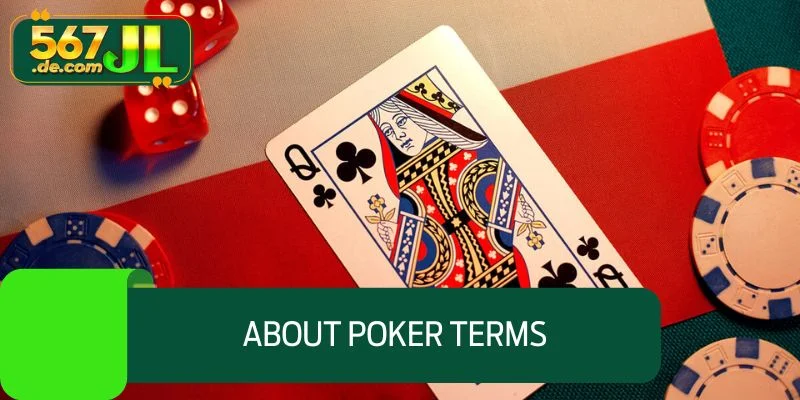Poker Terms is a comprehensive guide that helps players gain a deeper understanding of the game and improve their skills. Once you have a firm grasp of the basic concepts, you will easily access sophisticated strategies. Join 567JL to learn a detailed dictionary, helping members improve quickly and confidently in each game.
Contents
What are Poker Terms?

Poker is a famous card game where skill, strategy and luck combine to create a unique appeal. Each variation of the game has its own set of rules and strategies, requiring players to master the rules of the game to make the right choices in each situation.
Throughout the game, in addition to understanding Poker Terms, players need to observe their opponents’ actions and consider their own hand before deciding to continue, raise or fold. These decisions create a confrontational environment that requires flexible thinking and the ability to read the situation, providing a challenging and engaging experience.
Benefits of mastering Poker Terms in every game

Understanding Poker Terms helps players grasp the rules quickly and at the same time creates an advantage in observing opponents. This is the necessary foundation for you to develop from a beginner to a proficient player:
- When you have a good grasp of the terminology, it will be easier for you to follow the action on the table. You will not be confused by words like “Check”, “Raise” or “Fold”.
- Understanding concepts like “Position”, “Pot Odds” or “Bluff” helps you read your opponents and calculate risks effectively. Knowing the meaning of each action helps you know when to attack or defend.
- Mistakes often occur when players do not understand the rules or use the wrong terminology. By understanding correctly, you can avoid making wrong actions or betting mistakes.
Poker Terms you need to know to play cards more confidently

There are many terms in poker that players need to master. These include the concept of table position, card values, and options for action during the game:
Terminology of Membership Position
To be proactive in decisions and increase the chances of winning, players need to understand the terminology related to position. Here are some poker concepts about player positions at the table:
- The dealer is called a “Dealer”, each casino usually has its own professional “Dealer”. In the beginner table, the Dealer position is determined by the turn of play.
- The first position to the left of the “Dealer” is called the “Small Blind (SB)”, responsible for placing the first bet when the game starts.
- The second player to the left of the “Dealer” is the “Big Blind (BB)”, who also places the opening bet for the new round.
- “Early Position” is a Poker Terms that refers to a sitting position in a betting round where the person must act before the other members, for example the person sitting third from the left of the Dealer.
- “Dealer Button” or “Button” indicates the Dealer position in the next round, marked by a round plastic piece with the letter D indicating the Dealer position.
Poker Terms on options when playing
According to the experience of many experts, to win poker, players need to clearly understand how to play and related terms:
- Flat call: Make a call on the bet when the hand is strong enough to continue calling.
- Cold call: Call when someone has already bet and someone else has raised.
- Open: Open the bet, meaning you are the first person to put money into the pot.
- Limp: Calling a bet by calling instead of betting.
- 3 – bet: Re-raise, usually happens pre-flop, after someone has bet and raised.
Advanced Keyword Roll Call
Besides the common Poker Terms above, the game also has many less common but still important words:
- Ante: Small bet that must be placed before each round or at the end of the tournament, varies depending on tournament rules.
- Bankroll: Total capital (purchased chips) of the player.
- Bankroll Management (BRM): How to manage capital to avoid total loss when playing long term.
- Bad Beat: When you have a strong hand from the start but lose because of an unexpected card from your opponent.
- Buy-in: The amount of money to buy a ticket to join a game or table, including the house fee and the prize.
- Calling Station: Player always calls even if the hand is weak, rarely folds.
Tips for remembering and using terms in fast Poker
Once you have understood enough of the above keywords, to remember them all clearly, you need a few very popular memory tips:
Learn words in groups
Instead of learning each Poker Terms separately, you should group them by topics such as cards, betting rounds, actions, and strategies. This classification helps you memorize faster and apply them easily when playing. At the same time, this way of learning also creates logic, helping you grasp the meaning of each term more clearly.
Practice by playing
Playing free games is the best way to relax and familiarize yourself with the terminology. When you play regularly, you will quickly memorize how each word is used in real life. Constant practice will help you gain confidence when you enter the real betting games.
Watch videos & read documents
Watching international Poker tournaments or studying professional books will help you understand the meaning of each Poker Terms. You will understand how to apply them to each situation on the table. This process helps improve your judgment and make more accurate decisions in real games.
Conclude
This article is designed to guide beginners to Poker Terms. We hope to equip you with the basic knowledge to participate in the game confidently and effectively. Please continue to follow the next articles at 567JL to expand your knowledge and improve your playing skills.
